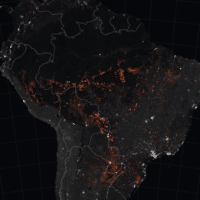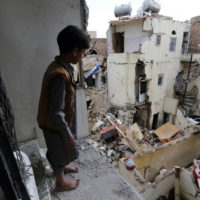-
What media like best about Elizabeth Warren: She’s not Bernie Sanders
If Warren ever finds herself without media’s bête noire to draft off of—assuming her policy stances remain the same—the media headwinds can be expected to get much more intense for her.
-
Playing the Trump card
Clearly, the ingredients of anti-Trump cooking create a very mixed batter. Some spoonfuls may even contain a “Save Biden as candidate” flavor, outweighing the truly weighty reasons for baking a completely new kind of cake.
-
iPhone workers today are 25 times more exploited than textile workers in 19th Century England
A recent report by the International Labour Organisation shows that the total global labour force is now measured at 3.5 billion workers. This is the largest size of the global labour force in recorded history. Talk of the demise of workers is utterly premature when confronted with the weight of this data.
-
Notebook #2: The Rate of Exploitation
The rate of exploitation in the production of Apple’s iPhone X, which stands at 2458%, is 25 times the rate of exploitation that is gleaned from Marx’s examples in Capital, published in 1867.
-
The Venceremos Brigade at 50
As the U.S. ramps up its global efforts to protect genocidal racial capitalism, it is a crucial time for a new generation to study and learn from Cuba’s 60-year effort to build an alternative socio-economic system.
-
The Bidens, Trump, Kiev and impeachment
The impeachment drive is quickly gathering steam, and who can have any sympathy for that man in the Oval Office? But I wonder if some enthusiasts may not be digging deeply enough.
-
Greta Thunberg speech
Around the year 2030, we will be in a position where we probably set off an irreversible chain reaction beyond human control, that will most likely lead to the end of our civilization as we know it.
-
Marx in the Museum
One of Marx’s brightest concepts, perhaps his profoundest dialectical construct in Capital, is the “fetishism of commodities.” It emphasizes something very important about the foggy world of appearances and how can forget what lies within, behind what is immediately apparent. We can read it as a parable in which Marx tries to bring to life (and light) the “secret” of the ostensibly trivial commodity, the genie that exists within the magic bottle.
-
“Down with the Rebels Against the Bill of Sale!”: Guy Endore’s Radical Reimagining of Haiti and Revolution
The American occupation of Haiti lasted from 1915–34. The U.S. subjected Haitians to the hated forced labor system of the corvée, seized control over Haitian finance, and rewrote the Haitian Constitution at gunpoint, enabling foreign companies to acquire land in the country. The distorting and oppressive impacts of the U.S. occupation have been felt in Haitian society ever since.
-
Dossier no. 20: When you ill-treat the African people, i see you
The Industrial & Commercial Workers’ Union (ICU)—a trade union, rural peasant movement, and urban squatters’ movement—formed on the docks in Cape Town in 1919. Within a decade, the ICU had expanded across Southern Africa without regard for national borders and counted people from various African countries and the Caribbean in its leadership, as well as people who were Indian and mixed race. The largely forgotten history of the ICU is well worth recovering in a time of escalating chauvinism and xenophobia. Our Dossier #20 offers an introduction to this extraordinary popular movement.
-
Understanding the fires in South America
Extractivist governments are stoking destruction in the Amazon and beyond. International alliances and Indigenous technologies can help protect the biome and support its 30 million inhabitants.
-
How can Sweden be a peace broker for the war in Yemen if it’s also selling the arms that make it possible?
Sweden might have some credibility if it banned weapons sales to Saudi Arabia and the UAE. It is not enough to be moved by the tragedy in Yemen. Action is necessary.
-
Mixed joy and great sorrow
In Saxon and Brandenburg, the leading parties held their lead and headed off the threat by the AfD. But in both states they were painfully weakened.
-
Are German greens on the left?
The three states in Eastern Germany now facing elections (two of them on Sunday) will be forced to decide on coalitions; no party will be strong enough to rule alone, most likely not even in two-party tandems.
-
Degrowth: a theory of radical abundance
Degrowth seeks to invert the Lauderdale Paradox. By calling for a fairer distribution of existing resources and the expansion of public goods, degrowth demands not scarcity but ratherabundance (see Sahlins, 1976; Galbraith, 1998; Latouche, 2014; D’Alisa et al., 2014).
-
Outsourcing exploitation: global labor-value chains
Through their control over supply chains, multinationals based in the global north exploit workers in the global south.
-
Why the world is watching the fate of an Iranian tanker in the Mediterranean
The British, it is clear, seized the Iranian tanker at the urging of the United States. There was no previous British warning that it might enter in such a muscular way into the U.S. attempt to suffocate Iran.
-
A Tale of Corruption by the United Auto Workers and the Big Three American Automakers
What follows is a somewhat complex tale of what happens when a labor union, structured to be unaccountable to the rank-and-file membership, embraces a system of labor-management cooperation rather than a class-conscious understanding that workers and their employers are adversaries with fundamentally opposed goals and desires.
-
Warnings ancient and modern
Before the Berlin Wall was torn down we all made sarcastic jokes about its official designation by East German (GDR) party leaders as “anti-fascist protective barrier”. But hearing racist ranting by AfD leaders now hoping for victories and seeing gangs of marching thugs with barely–paraphrased Nazi slogans we must wonder if perhaps that scorned terminology also contained just a bit of truth.
-
Why Kashmir is suddenly a potential global point of conflict
Before India’s Home Minister Amit Shah introduced the Jammu and Kashmir Reorganization Bill in the Indian Parliament, his government sent tens of thousands of Indian troops into Kashmir. There is no official number, but it is often said that there are nearly 600,000 Indian troops in the state. That a population of 12 million people needs this kind of armed action suggests that they are an occupied people.

















